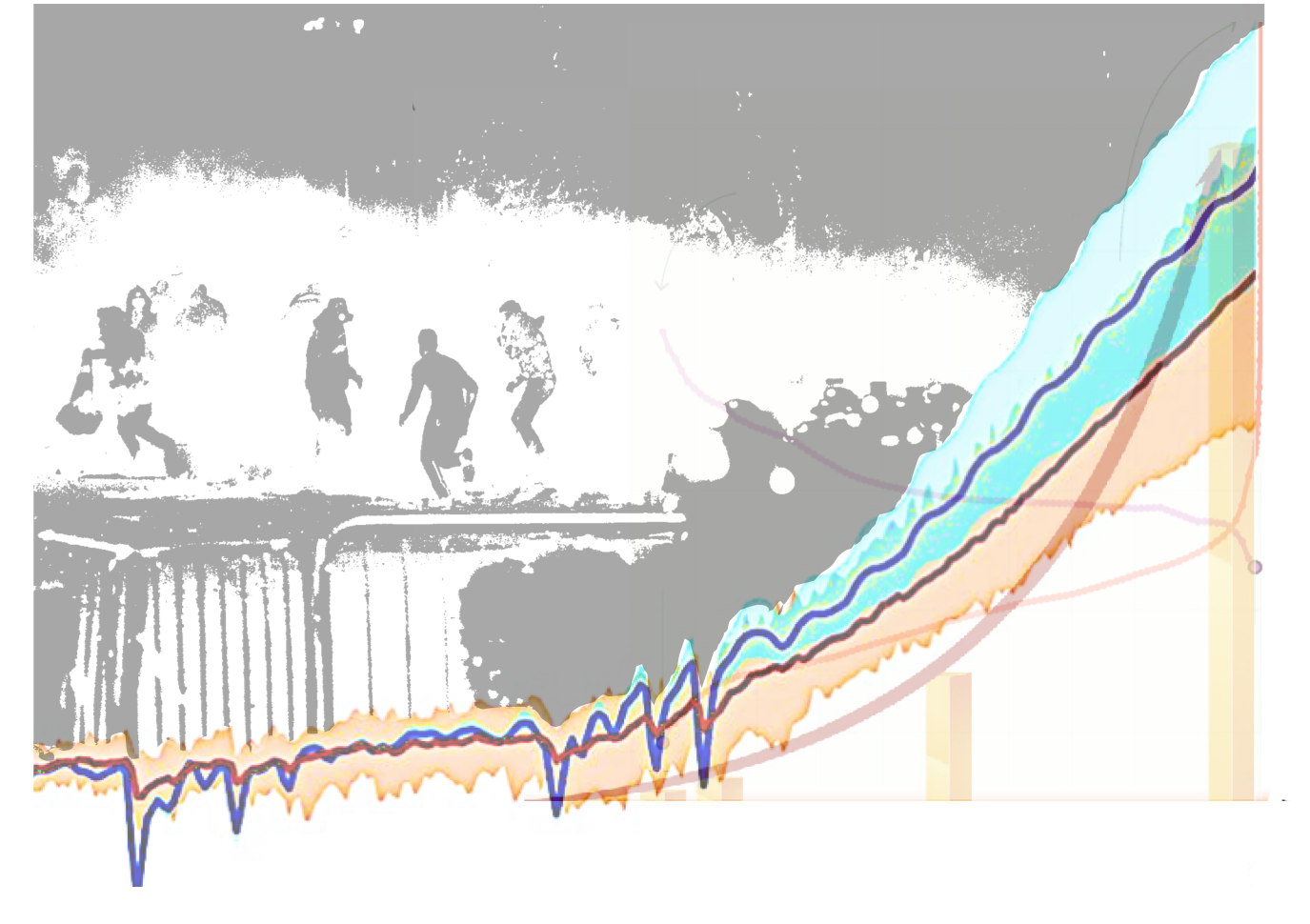Award winning South Korean director Bong Joon Ho is celebrated world-over for his remarkable Oscar-winning masterpiece “The Parasite”. Much before the world could witness the craftsmanship of Bong through Parasite, he enthralled his audience with the emotionally raw, tearjerker “Okja” which delicately portrays how the self-obsessed & egotistic human race could cross any boundaries; go to any length of cruelty, trample not just the environment but also fellow co-existing animals and even other people to attain their greed. ‘Okja’ intrigues its audience in the same way that a magic mirror reflecting our inner instincts would.
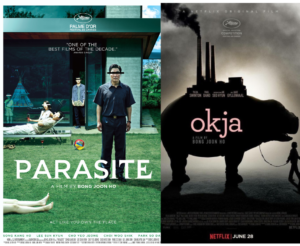
Bong Joon Ho’s Parasite & Okja. Source: imdb.com
Reality is not quite far from the movie. Our consumerists’ lust for ‘the finer things’ overrides fundamental freedom of indigenous communities and those of other species. The lustre of our scarlet crème lipstick weighs in priority for fish oil, than the lives of whales at sea; the elegance of a Cashmere shawl exhibiting our ‘net worth’ seeks precedence enough to slaughter goats at Ladakh; and the cries of cattle at tanneries get muffled into a distasteful silence to get our leather’s worth.
The celebrated Henry Ford factory line system brought in efficiency, productivity and along with it came the ‘compulsive mindset’ to automate and mass produce everything. Farming; once a noble sector blending with nature to feed hungry mouths; has also fallen prey to the compelling drive of deriving “factory-based output”. The gross animal cruelty caused by factory farming cannot be brushed aside. According to the United Nations, the number of industrial livestock dispatched to slaughterhouses each year equates to eight times the human population on planet Earth – A record never before witnessed in history.
2021 is shaping up to be a humanitarian catastrophe; or as coined by executive director of the World Food Programme, David Beasley it is the “the worst humanitarian crisis year since the beginning of the United Nations”. With a near 40% increase from the 2020 numbers; a record 235 million people are estimated to need humanitarian assistance and protection this year.
The cocoa industry has profited from the persistent abuse of forced labour in West Africa since the early nineteenth century. However, the past decade, has been no stranger to numerous alarming reports of child slavery in a pursuit to satiate the world of its “coco cravings”. Denim, especially in the form of “blue jeans” is regarded as America’s landmark contribution to fashion worldwide. Yet, what is concealed from plain sight is that its inception erupts through thousands enslaved in pitiable labour conditions even in today’s 21st century technology fuelled, free-democratic world; a reality that ought to leave us grief-stricken over the cognizance that it is was never just about “me & my old blue jeans”.
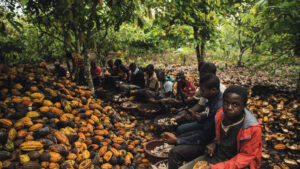
Child labour in the Coco Industry. Source: Raconteur
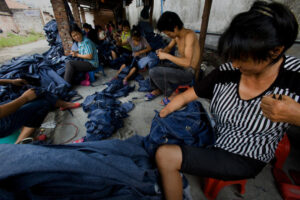
Labour Abuse in the Denim Industry. Source: NRDC
The 2021 scientific report by the UN Intergovernmental Panel on Climate Change (IPCC) estimates cumulative CO2 emissions since pre-industrial times and provides a CO2 budget for future emissions to limit warming to less than 2°C. About half of this maximum amount has already been emitted by 2011. From 1901 to 2010, the global average sea level rose by 19 cm as oceans expanded due to warming and ice melted. The sea ice extent in the Arctic has shrunk in every successive decade since 1979, with 1.07 × 106 km² of ice loss per decade.
While aspects of the above concerns may appear distinct and diverse, one would be quite surprised when they learn that these issues are in fact intricately interconnected with one another. To achieve a holistic overview, one must delve into unravelling the genesis of consumerism.
The Sociological Perspective
Consumerism sparked its presence in the middle of the twentieth century as the brainchild of a transnational elitist-capitalist class and today has penetrated deep into our mainstream way of life. The fundamentals of economics which are need based; stem from the presumption of “limited resources chased by never-ending wants”. Therefore, most economic frameworks and systems have been designed with a predatory instinct of cut throat competition to “acquire the most benefit” before others manage to get access to them. Firms continue to scheme in a frenzy for profit maximization while we consumers obsess over gross accumulation of “more and better”.
The objective of consumerism is to initiate intensive spending: i.e. to get consumers to constantly buy and consume goods or services and to increase consumption over time. To achieve this consumerism evokes normative doctrines that promote spending through facilities like free choice and fair distribution of goods and services based on supply and demand, equal access to commercial resources, and new product innovation (Bernd Schmitt 2021).
Despite paying loads of money to buy the latest iPhone with envious features; the news of the subsequent iPhone model launch always leaves us in resentment. This is because consumer desires are pleasurable but also powerfully evoke discomforting emotions of longing for particular commodities (Rusell W Belk 2003). The ardent urge to consume goods and services is so thoroughly embedded into our daily lives, that several aspects of its practice are undisputedly adhered to : not only have we overlooked its apocalyptic environmental and social consequences, but the very notion that consumption itself “is a liberating choice” has covertly transposed itself into “an obligated bondage”.
This is evident in “Die Deutsche Ideologie”, a series of classic texts co-authored by Karl Marx and Friedrich Engels which claims that one of the dominant ideas of the ruling class is to obfuscate exploitation by creating a “false consciousness,” to prevent the oppressed from realizing that they are being exploited (Marx and Engels 1848/2011). Neo-Marxist critical thinkers of the Frankfurt School argued that the uniformity of mass media induces docile conformity among the masses and demand for capitalist products while inhibiting pluralism and independent thought.
This leaves us in a despairing cycle of income generation pledging hours of toiled labour at work, while yearning for enough monetary compensation, only to end up spending each nickel and dime into accumulating more and more of consumer goods or services.
What makes us numb to evident Atrocities?
“Political language is designed to make lies sound truthful and murder respectable, and to give an appearance of solidity to pure wind. ” George Orwell
The dominance of global media and advertising has unveiled an inexplicable sorcery of transforming raw disturbing facts into placid, smoothing and attractive visual imagery of goods to entice consumers. Playing on the myopic amnesia of people, despite availability and access to numerous scientific reports on cruelty-based products; the sales of most brands continue to soar unperturbed. Strategic placement of youth icons like sportspersons and celebrities as brand ambassadors to agitate people off their status quo and propel them to aspire for ‘different’, ‘more’ or ‘better’ influences consumer behaviour across populations. Failure to comply with the dynamic trends, leaves one in the fear of being an ‘outcast’ or ‘too uncool’ which is fervently overcompensated with intensive consumption.
Additionally, the Darwinian theory of evolution has been misconstrued in the understanding of ‘superiority’ as a license for the human race to conquer or subjugate other “inferior or (perceived as irrelevant)” species. This gives us enough justification to brutally abuse other cohabitant species in the notion that we ‘own planet earth’.
The Minimalist Brigade to the Rescue?
The present Covid-19 pandemic, taught us a huge lesson of re-focusing our priorities to the essence of life: human value & health, family, community and harmony. People today appreciate the virtue of Minimalism which is characterized by adequate sparseness and simplicity. The Japanese cleaning Guru Marie Kondo and her renowned “KonMari” Method of decluttering our lives by cherishing only commodities we ‘love & need’. Maslow’s hierarchy of needs places one’s quest for self actualization at the apex of any other need. While consumerism can only aid to meet basic needs of survival or in some cases help us experience short term sense of security, love and respect; Minimalism broadens the spectrum with stability and content. A life of simplicity has been found to have positive results in one’c emotional balance, happiness and a sense of fulfilment.

The KonMari method. Source: Femina.in
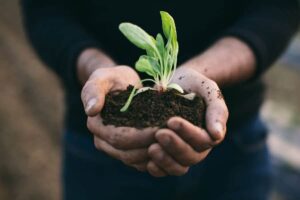
Minimalism & Sustainability. Source: The Minimalist Vegan
As the clock ticks by….
The perils we are grappling with are intertwined in numerous interactive loops wherein one affects the other severely. Poverty compels one to be subjugated into abusive labour or engage in outdated farming methods thereby destructing our environment. Scantiness engulfs ‘the powerful class’ with the manic urge to manipulate markets and accumulate resources to extract profits.
While the world has its dreams set on aiming for the stars with cutting edge AI any revolutionary robotics, in the never-ending quest to ‘make comfortable lives more comfortable’ and fill in ‘already full’ pockets; as the clock ticks, may the words of these prose stop you at your feet and urge you to think. For, the day we realise that the human species is merely a fragment of several living organisms created by nature and not the supreme propagator of the fate of planet earth, we will finally be able to coexist in a holistic harmony.




